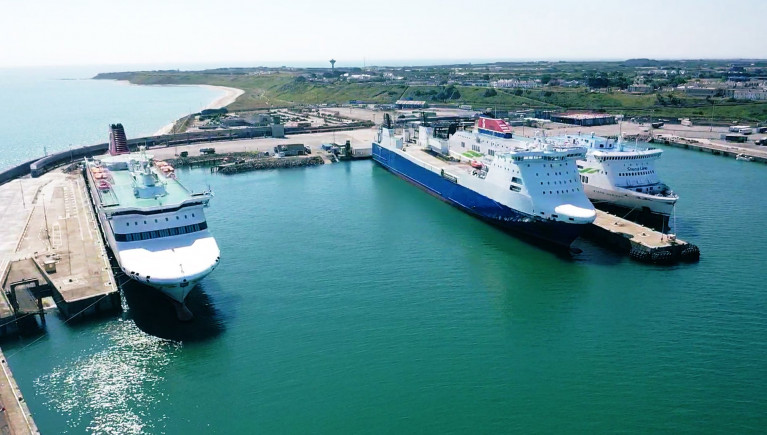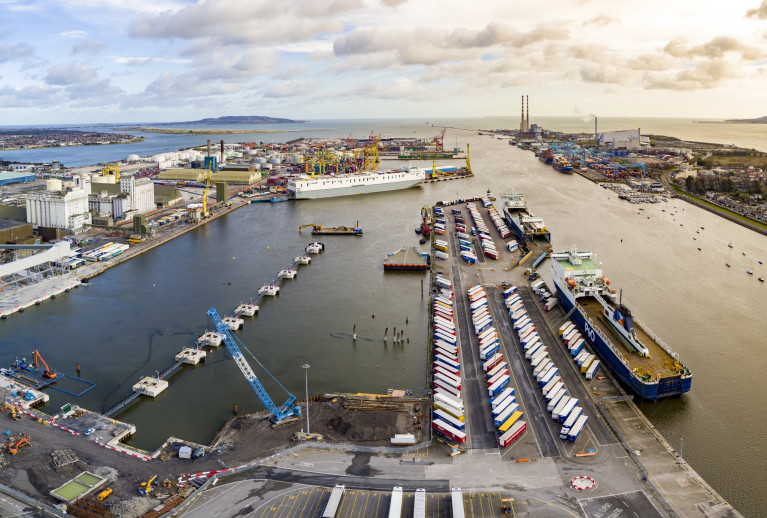Displaying items by tag: BREXIT fallout
Traffic from lorry freight on ferries with British ports dropped 22 per cent last year due to new post-Brexit checks on EU-UK trade, a report from the Irish Maritime Development Office has found.
The Government agency that promotes Irish shipping services said that a combination of a rebound in demand in port traffic as Covid-19 restrictions were eased and new post-Brexit border controls led to a year of “significant change” in roll-on, roll-off (ro-ro) lorry freight traffic.
Traffic on direct routes between Irish ports and mainland Europe rose 94 per cent last year, driven largely by reduced use of the “landbridge” route across Britain with continental Europe.
New border checks on trade between Ireland and Britain as Brexit came into effect led to “unprecedented increases” in ro-ro and container shipping volumes on direct routes with Europe.
The post-Brexit border controls on Irish-British trade through ports in the Republic led to the redirection of Northern Irish traffic from ports in the Republic to Belfast, Larne and Warrenpoint.
For further reading, The Irish Times has more in addition the report from the IMDO website can be downloaded here.
Committee to Hear Hauliers Facing 'Catastrophic Consequences' Over Brexit
An Oireachtas Committee will hear the Irish Road Haulage Association calling for a single entity to take charge of the free movement of traffic from ports ahead of Brexit.
Its President, Eugene Drennan, reports RTE News, is due before the Oireachtas Committee on Transport and Communications Networks later today.
He will warn politicians that even if a Brexit deal is reached, hauliers are facing "catastrophic consequences" due to delays and obstructions at ports and airports.
Drivers will face checks from Revenue, the Department of Agriculture, the Health Service Executive and An Garda Síochána.
Mr Drennan is also requesting that the Road Safety Authority and Department of Transport take a more lenient approach to licensed hauliers, to ease some of the pressure they will be under.
Shipping Review: Marine Minister Voices Concern on Brexit, UK Chancellor's Port of Call & ESPO Roadmap
#ShippingReview - Jehan Ashmore reviews the shipping scene over the last fortnight.
Following the momentous decision of the British electorate to vote 'Leave' from the EU, the Irish Minister for the Marine issued a statement in which he said “The UK exit vote also raises complex issues for the fisheries sector. Of course, the most immediate concerns for agri-food exporters centre on exchange rates”.
It was earlier this month that the UK Chancellor of the Exchequer, George Osborne visited Warrenpoint Port and local MP's in advance of the EU Referendum. The Co. Down port is where Cronus Logistics has taken over operations of Irish Sea container feeder services.
European Sea Port Organisation (ESPO) have launched a roadmap to cut out red-tape on maritime transport following the debate and implementation of the Reporting Formalities Directive (RFD).
Lo-Lo operator, Samskip launch track and trace capability for its 45ft refrigerated container fleet. Over time, the entire reefer fleet is expected to feature the track & trace capability.
RMS St. Helena having made a historic once-off visit to the Pool of London, bid farewell from Tilbury, on her final ever voyage from the UK, bound ultimately for St. Helena, some 4,500 miles away.
Rival flotilla’s on the Thames clashed over the EU Common Fisheries Policy. This led to Sir Bob Geldoff’s of the Remain camp trade insults with Nigel Farage, UKIP leader of the opposing Leave campaign.
Training vessel Empire State VI included a call to Dublin Port as part of the annual State University of New York’s sea-term. This is one of the requirements for cadets to earn a U.S. Coast Guard license.































































